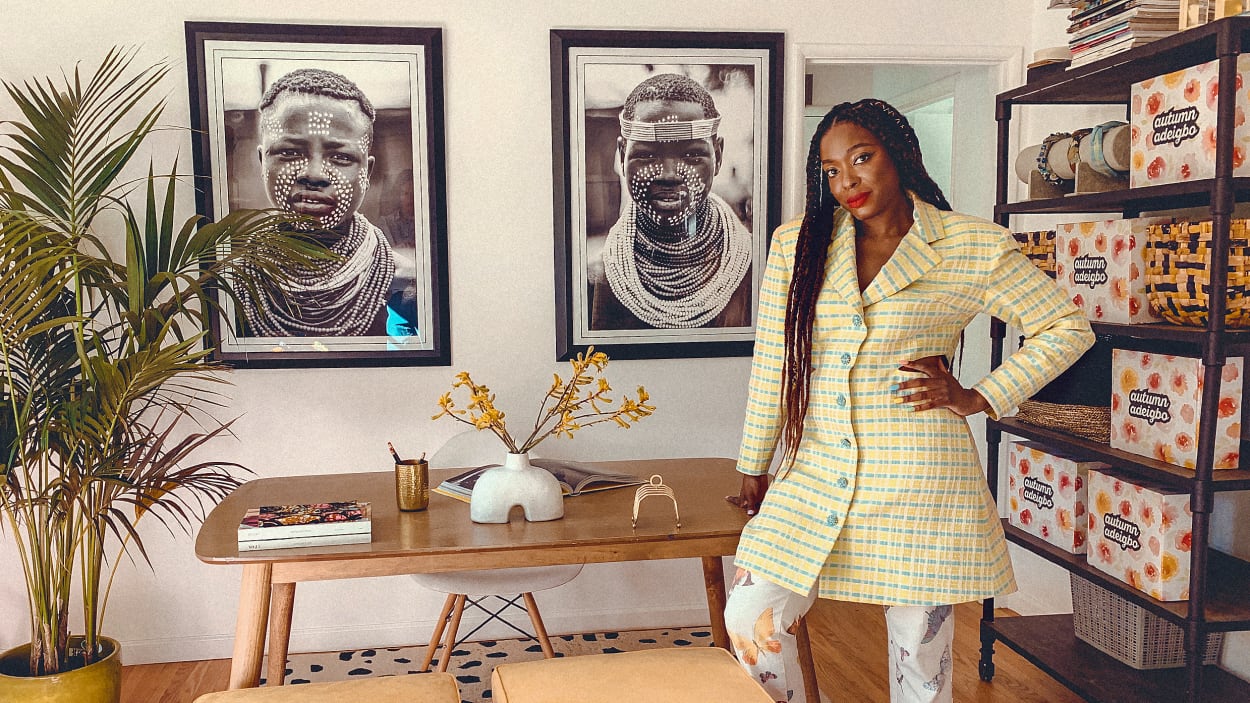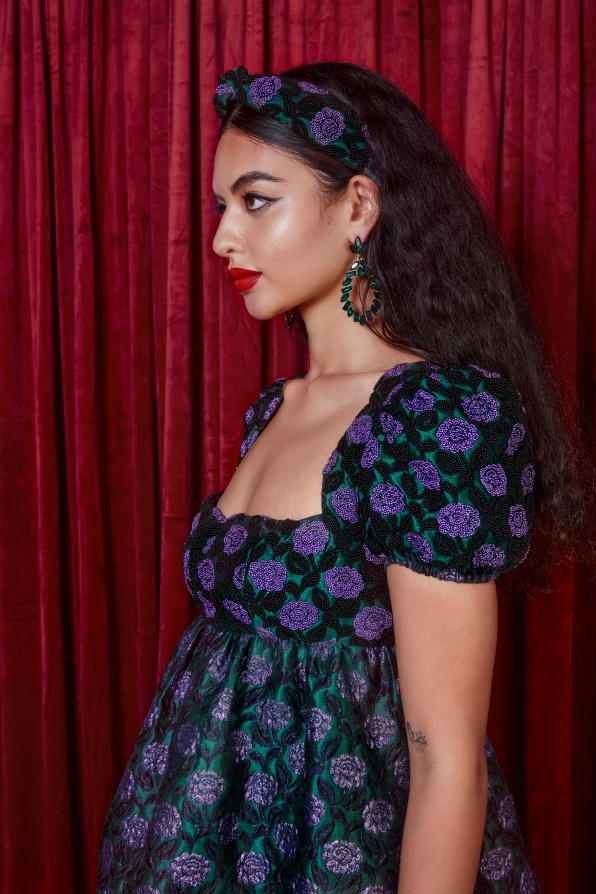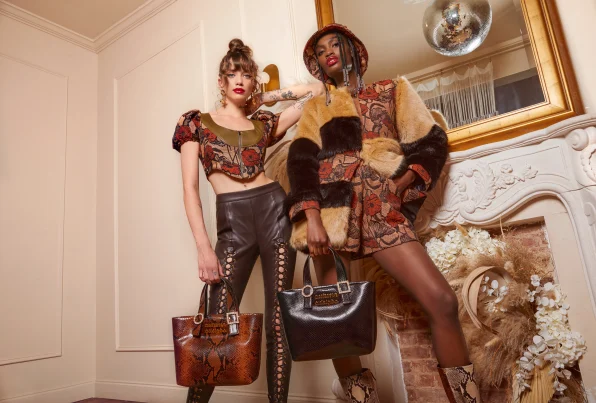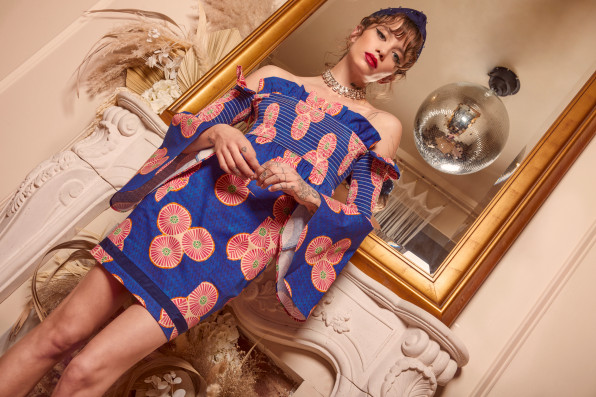How Autumn Adeigbo translated her Nigerian heritage into a celebrity – backed clothing brand

Mila Kunis, Cameron Diaz, and Gabrielle Union don’t just wear this Nigerian-American designer—they invest in her business.
Autumn Adeigbo, a Nigerian American designer who launched her eponymous label in 2016, has both. Her brand has been growing at a rate of 400% a year, partly because some of the most powerful women in Hollywood love her striking asymmetrical dresses and tops, made with Nigerian-inspired prints.
But last summer Mila Kunis, Cameron Diaz, and Gabrielle Union decided to invest in the designer’s $3 million venture capital round, bringing her total funding to $4.3 million. It was an important step to ensuring Adeigbo is able to build a robust, enduring brand in an economy where Black female startup founders earn 0.34% of all VC capital.
Adeigbo is at an important inflection point in her business, where she is able to scale. But she says that it took decades to build the foundation that led to his moment. “People look at my brand and think that it’s been an overnight success,” she says. “But that’s not the whole story. It took years of work to get here.”

A NIGERIAN AMERICAN FAMILY
For Adeigbo, creativity runs in the blood. Her parents met and married in Lagos, Nigeria, and soon after moved to upstate New York to start their family. As a child, Adeigbo observed her mother pursuing her creative passions, even though they weren’t well off. While raising her four children and studying to become a doctor, Adeigbo’s mom designed and sewed clothes, and also decorated cakes.
Adeigbo attended Spelman College in Atlanta where she studied economics, but she realized that her real love was styling and designing clothes. Her parents supported her decision, which Adeigbo says is unusual in an immigrant family. When she went home for the holidays, her mother would encourage Adeigbo to sew pieces she’d sketched out during the school year, taking her to Jo-Ann fabrics to buy the materials.
After college, she took a yearlong course in fashion design Parsons School of Design with the goal of becoming a designer. One day, while she was walking on the street, she serendipitously bumped into the designer Betsy Johnson and she took the opportunity to start a conversation with one of her idols. The chat went well, and Johnson invited her to take an internship on her design team. Adeigbo gratefully accepted, but then she began to realize how hard it would be to navigate the politics in the fashion industry.
A CLIQUISH INDUSTRY

At 22, Adeigbo joined Johnson’s other designers, helping create the brand’s upcoming season. But she found that people weren’t particularly warm or supportive of outsiders. “In fashion, people you work for pay a lot of attention to what labels you’re wearing or what bag you’re carrying,” Adeigbo recalls. “Some interns seemed to carry a new designer bag every day. I didn’t come from a lot of money, so I couldn’t compete. I vowed that if I ever started my own label, I wouldn’t create an atmosphere like this.”
Adeigbo’s experience aligns with many peoples’. Fashion is notoriously exclusionary: Historically, it has been hard for people of color to break in. Until recently, designers and fashion magazines didn’t pay interns, so you had to be connected and independently wealthy to get a spot. (Vogue and Vanity Fair shut their internship programs down after former interns sued.) As a result, the industry is not diverse.
Adeigbo didn’t want to let these hurdles get in the way of her success. “I don’t really see the world in racial terms, but it’s true that there weren’t many people who looked like me at these companies,” she says.
For the next decade, Adeigbo took jobs across the fashion industry, from working in Anna Sui and Paul Smith’s retail stores, assisting celebrity stylist Andrea Lieberman, and writing for W Magazine (and even documenting her entrepreneurship journey for Fast Company). “By then, I had saved clothes from all my previous internships and jobs, so I could look the part,” she says. “All of this work gave me the confidence to walk into rooms full of powerful people in fashion, and hold my own.”

THE TIPPING POINT
Even as she worked for other brands, Adeigbo was dreaming up what her own would look like. She wanted to use traditional African prints that she had seen on her trips throughout the continent, incorporating them into modern, Western silhouettes. She began sewing her own garments after work and put together a business plan for her company. In 2009, she started doing trunk shows around the country to introduce people to her style.
“What stands out about Autumn’s aesthetic is that it pays homage to her heritage, but she interprets it through the lens of fashion design,” says Lisa Smilor, EVP of the Council of Fashion Designers of America, the country’s most prestigious fashion industry organization. “Her style exudes a lightness and optimism that translates well to the pages of fashion magazines and windows of Saks Fifth Avenue.”
But while she was getting her name out, she wasn’t making enough money to quit her day job. She needed capital to be able to manufacture inventory and market the brand in earnest. Then, the money came through from an unexpected source. Early in her career, Adeigbo had tempted at a construction company to make ends meet, and the owner of the company had seen how hard she worked. When she mentioned she wanted to launch her own fashion business, he offered to give her $100,000 so she could get started. “I had always believed that hard work and good ideas were the way to succeed,” she says. “With this investment, I finally felt like it was paying off.”
In 2016, she launched the brand in earnest, creating a website and working with a factory in the Garment District in New York to manufacture clothes. While most garment factories prefer to take fixed orders because it guarantees revenue, Adeigbo has built a strong relationship with one particular factory owner who has partnered with her to make clothes on demand. When a customer places an order online, it is made-to-order and delivered in three to six weeks. It’s a supply chain that blends the ready-to-wear and couture business models. “There is so much waste in the fashion industry, but this approach just seemed like a no brainer,” she says. “We don’t ever waste inventory.”

In 2019, she won a fellowship from the Tory Burch Foundation, where Tory Burch mentored her directly. When the Black Lives Matter movement took hold of the country in 2020, the fashion industry faced a reckoning about how hard it was for Black designers to gain a foothold. “People began looking around for Black designers to support,” Adeigbo says. “My brand stood out, but that was only because I had been working for years—more than a decade—to get to where I was.”
“Observing her career unfold, it was clear that she had hustle and passion, but importantly, she didn’t take for granted that fashion is a business,” says Smilor. “She’s always been smart about not overproducing because she immediately understood that placing large orders means more liability. People don’t always understand that being a fashion designer is not just about creativity; it’s about your nose down and updating your business plan every season, because often, slow and steady wins the race.”
Over the past two years, Adeigbo has hit a tipping point. She received two rounds of VC funding, including the $3 million round led by entrepreneur Brit Morin’s Offline Ventures, along with the celebrities. She was invited to become part of the Council of Fashion Designers of America, the industry’s most prestigious association. And she has received prizes from Parsons and the National Black Arts Fine Art And Fashion Awards. Her collections have been picked up by Rent the Runway, Bergdorf Goodman, and Neiman Marcus.
Now, she’s working to continue growing her business by increasing her customer base and partnering with more retailers to expand her distribution. All of this means scaling up her manufacturing, since she needs to delivers these companies large orders. “We’re hoping to get to the point where we can own our factory, so we’ll be entirely vertically integrated,” she says. (She plans to keep making all online orders on demand.)
Adeigbo had to jump through many hoops to get to this point. Ultimately, she feels like many of these obstacles were unnecessary, and designed to keep people out of the fashion industry. Now that she’s achieved some success, her goal is to make the path smoother for the next generation of designers. “We’re now hiring rapidly,” she says. “I want to create a culture here that is welcoming, where hard work and good ideas are rewarded.”







